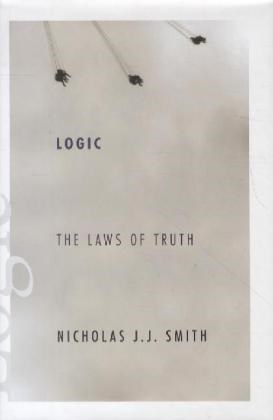Ulteriori informazioni
Zusatztext "An excellent textbook for an undergraduate course on this topic." ---Peter W. Evans, Philosophy in Review Informationen zum Autor Nicholas J. J. Smith is senior lecturer in philosophy at the University of Sydney in Australia. He is the author of Vagueness and Degrees of Truth . Klappentext "Smith's book combines accessibility with comprehensiveness in a way that I have not found in other texts. It is very readable and well paced, but does not sacrifice precision. Difficult issues aren't glossed over or skipped, but are introduced at a gentle pace for novice logicians. As a teacher of logic, I see real benefits in Smith's approach." --Jennifer Duke-Yonge, Macquarie University, Australia "Lots of books aim to provide a first introduction to symbolic logic. I predict that this one will be widely adopted throughout the English-speaking world. One of its unique strengths is that it broaches important philosophical issues that naturally arise in connection with symbolic logic. The book thus serves both as an introduction to logic itself and to the philosophy of logic." --Stewart Shapiro, editor of The Oxford Handbook of Philosophy of Mathematics and Logic Zusammenfassung Logic is essential to correct reasoning and also has important theoretical applications in philosophy, computer science, linguistics, and mathematics. This book provides an exceptionally clear introduction to classical logic, with a unique approach that emphasizes both the hows and whys of logic. Here Nicholas Smith thoroughly covers the formal tools and techniques of logic while also imparting a deeper understanding of their underlying rationales and broader philosophical significance. In addition, this is the only introduction to logic available today that presents all the major forms of proof--trees, natural deduction in all its major variants, axiomatic proofs, and sequent calculus. The book also features numerous exercises, with solutions available on an accompanying website. Logic is the ideal textbook for undergraduates and graduate students seeking a comprehensive and accessible introduction to the subject. Provides an essential introduction to classical logic Emphasizes the how and why of logic Covers both formal and philosophical issues Presents all the major forms of proof--from trees to sequent calculus Features numerous exercises, with solutions available at http://njjsmith.com/philosophy/lawsoftruth/ The ideal textbook for undergraduates and graduate students Inhaltsverzeichnis Preface xi Acknowledgments xv Part I Propositional Logic 1 Chapter 1: Propositions and Arguments 3 1.1 What Is Logic? 3 1.2 Propositions 5 1.3 Arguments 11 1.4 Logical Consequence 14 1.5 Soundness 21 1.6 Connectives 23 Chapter 2: The Language of Propositional Logic 32 2.1 Motivation 32 2.2 Basic Propositions of PL 32 2.3 Connectives of PL 36 2.4 Wff Variables 39 2.5 Syntax of PL 40 Chapter 3: Semantics of Propositional Logic 49 3.1 Truth Tables for the Connectives 49 3.2 Truth Values of Complex Propositions 51 3.3 Truth Tables for Complex Propositions 54 3.4 Truth Tables for Multiple Propositions 58 3.5 Connectives and Truth Functions 59 Chapter 4: Uses of Truth Tables 63 4.1 Arguments 63 4.2 Single Propositions 67 4.3 Two Propositions 69 4.4 Sets of Propositions 74 4.5 More on Validity 75 Chapter 5: Logical Form 79 5.1 Abstracting from Content: From Propositions to Forms 81 5.2 Instances: From Forms to Propositions 82 5.3 Argument Forms 84 5.4 Validity and Form 87 5.5 Invalidity and Form 91 5.6 Notable Argument Forms 94 5.7 Other Logical Properties 95 Chapter 6: Connectives: Translation and Adequacy 97 6.1 Assertibility and Implicature 97 6.2 Conjunction 103 6.3 Conditional and Biconditional 110 6.4 Disju...
Info autore
Nicholas J. J. Smith is senior lecturer in philosophy at the University of Sydney in Australia. He is the author of
Vagueness and Degrees of Truth.

